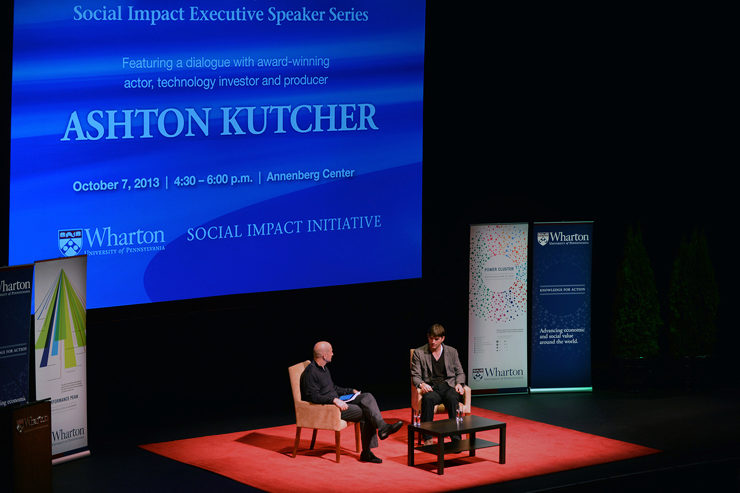Want to change the world? First, change yourself.
That was the theme of the night, during Monday’s revealing tableside chat between Wharton alumnus Bobby Turner and actor, producer and tech investor Ashton Kutcher.
The Lauren and Bobby Turner Social Impact Executive Speaker Series brings high-profile guests to campus to speak their lives and how they have leveraged their power, fame, and wealth to change the world.

Turner, W’84, hosts the popular speaker series as part of his mission to support social impact activities at Penn and enlighten students with the idea that “making money and making impact on the world are not mutually exclusive.” He prefaced the interview with a dynamic presentation on social impact and society, citing examples of how today’s students strive to create meaningful change.
This latest occasion – the fifth since its establishment in 2010 with guest speaker Earvin “Magic” Johnson – drew record crowds. Roughly 3,000 students, faculty, esteemed guests and members of the Penn community registered for seats in Annenberg’s Zellerbach Theatre Monday night.
Kutcher spoke candidly during the ninety-minute interview, touching on his childhood in Iowa and acting career as the star of shows like “That 70s Show” and films like “The Guardian.” Later, he delved into his role as an investor in tech start-ups like InteraXon and Airbnb, and his advocacy for exploited children.
Though many know him as a good-natured sitcom star, the interview highlighted another side of Kutcher – the one that earned him as spot as one of Time Magazine’s Top 100 Most Influential people and a reputation for being proactively kind.
“When you are kind to people, and you fail, they are more willing to give you a second chance,” Kutcher said, relating how he worked his way up from humble beginnings in New York by “[working hard] and trying and being kind because I had to.”
“Good” is something that is good for you, good for me and good for the greater good. Bad is anything that doesn’t include all three. – Ashton Kutcher
Students appreciated Kutcher’s authenticity and candor when it came to discussing his triumphs, failures and views on changing society, according to responses published in The Daily Pennsylvanian today.
“Honestly, I came because, you know — Ashton Kutcher,” College freshman Amanda Irizarri told the student newspaper, “but actually, I loved hearing Bobby’s portion. It really stuck to me.”
In particular, many connected with Kutcher’s discussion of Thorn, the human rights organization he co-founded to disrupt the predatory behavior of those who abuse and traffic children through the Web.
Thorn, he explained, brought together a digital task force of companies like Facebook, Google, Microsoft and Yahoo! to work together on the task of identifying, flagging and removing child pornography from the Internet, in a more efficient and effective way than if those companies worked alone.
“When actors like Ashton take on a new acting role, they inherently have to practice an art of empathy to try to understand the lives of others,” says Wharton MBA candidate Elyse Lipman. “In hearing him speak, Ashton has a unique interest in how to translate empathy through technology. His career in acting, investment in technology companies, and work with foundations like Thorn all speak to this intersection between emotions and the digital space.”
Endowed in 2010 by Turner and his wife Lauren Golub Turner, W’85, the social impact speaker series has included figures like Eva Longoria, actress and founder of two nonprofit organizations, and Andre Agassi, the tennis star whose passion for education has established economically sustainable charter schools in underserved communities.
What ties them all together?
“The greatest sense of happiness and accomplishment that all of these speakers have is not the creation of fame of fortune. It’s not their wealth. It’s not being in front of the camera,” Turner explained to WSII prior to the sold-out event.” It is the opportunity they’ve had to have a positive impact on other people’s lives.”


